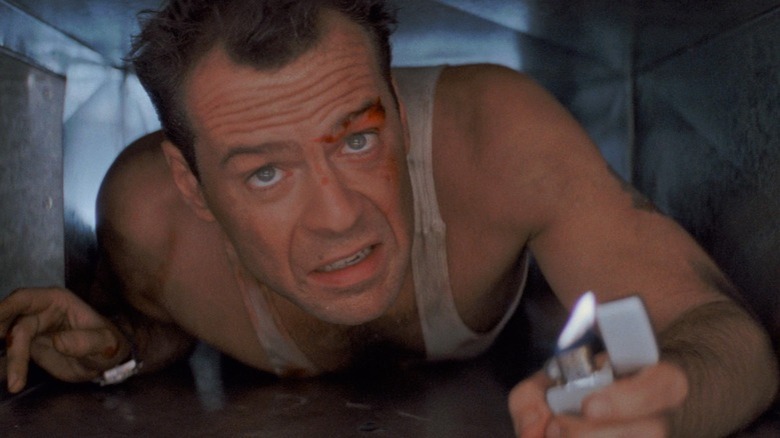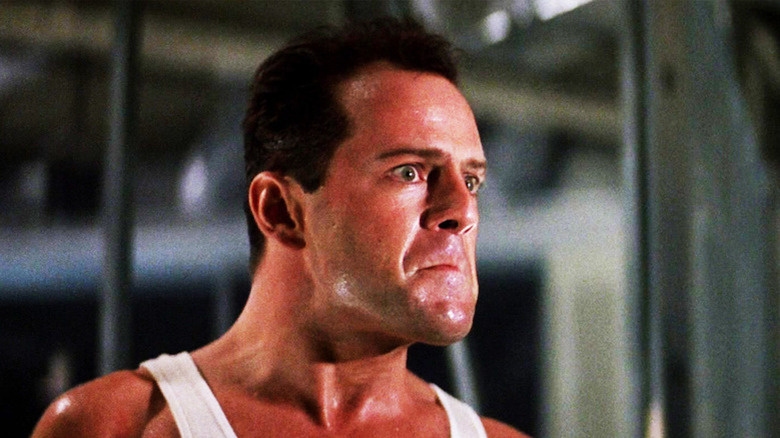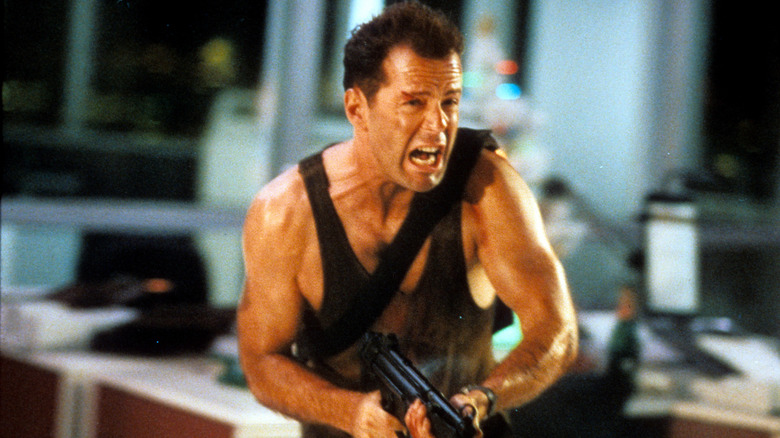Bruce Willis' Best Role Happened Because Of Desperation
The pitch was "Rambo in an office building." In the 1980s, the idea of a Rambo type in anything, anywhere would at least get your project shuttled down the studio production pipeline. 20th Century Fox rightly believed they had a potential winner in "Die Hard." So why was the project anathema to every A-list movie star in Hollywood?
Perhaps it was the pedigree. "Die Hard" was an adaptation of Roderick Thorp's action novel "Nothing Lasts Forever," the author's 1979 sequel to his 1966 bestseller "The Detective." That cop thriller had been turned into a 1968 star vehicle for Frank Sinatra, who was nearing the end of his 1960s big-screen comeback. It was a solid hit for 20th Century Fox, but, despite a feint toward grittiness, it was viewed as nothing more than a paycheck gig for the Chairman.
So 20 years later, when Fox spied blockbuster potential in Thorp's sequel (which was partially inspired by the studio's 1974 smash "The Towering Inferno"), the studio was faced with a peculiar casting hurdle: because of the deal they'd struck with Sinatra in the late 1960s, they were contractually obligated to offer the part to Ol' Blue Eyes. In the mid 1980s. The showbiz legend had just entered his 70s, and, aside from a cameo in 1984's "Cannonball Run II," had basically retired from acting.
When he said no, Fox began courting every single action star in town. How did that work out for the studio?
Nobody wanted Sinatra's seconds
When screenwriter Jeb Stuart began work on the screenplay for "Die Hard" in 1987, Fox went a-courtin'. Sylvester Stallone was the obvious first ask. Nothing doing. How about Clint Eastwood? How about his rarely broken loyalty to his home studio Warner Bros? Burt Reynolds? Nope. Mel Gibson? He was gearing up for his second go-round as Martin Riggs.
The list of declines was long, and got less distinguished the longer the casting process went on. Paul Newman, Harrison Ford, Richard Gere, Nick Nolte ... the studio evidently got all the way down to TV's MacGyver (and proud Ohio University almost-graduate) Richard Dean Anderson when they found themselves prepping a large-scale action movie sans an action star. Evidently, no one saw the upside of taking over a role originated by Sinatra in a mostly forgotten cop programmer.
Fox was desperate, and every agent in town knew it. If they wanted whatever constituted a "big name" in 1987, they were going to have to think outside the box and pay through the nose for it. They made a brilliantly bold decision, but they were vilified for it at the time.
The smartest $5 million 20th Century Fox ever spent
Bruce Willis was a big name thanks to the ABC Nielsen ratings smash "Moonlighting." But he was a TV star at a time when that was a second-tier profession in Hollywood and he was absolutely nobody's idea of a rough-and-tumble New York City cop. He was a wisenheimer private investigator. He was a goofball. He was more at home clutching a Bartles & Jaymes wine cooler than a .38 Special.
Fox, however, was on the clock, so they made a staggering $5 million bet on Willis' action hero potential. This salary was just south of what Dustin Hoffman earned for "Tootsie," and equal to the asking price of megastars like Robert Redford and Warren Beatty. These men were Hollywood royalty. Willis only had a lead role in Blake Edwards' zany comedy "Blind Date" on his big-screen resume.
"This throws the business out of whack," fumed MGM honcho Alan Ladd Jr. "Like everybody else in town, I was stunned." Fox's gamble began to look even more dire when the teaser trailer for "Die Hard" provoked derisive laughter in theaters across the country. The studio was so weary of its leading man's appeal, they removed him from the poster, replacing him with an exploding Nakatomi Plaza.
And yet they knew they had a hit. "Die Hard" was testing through the roof. So they juiced audience interest with sneak previews and put their marketing department, the very best in the town, to work. They came up with a killer tagline: "'Die Hard' will blow you through the back of the theater."
Moviegoers came for the spectacle, and left wanting to see Bruce Willis in every goddamn thing. "Die Hard" remains one of the most ballsiest risks in Hollywood history, and we'll never see its likes again.


